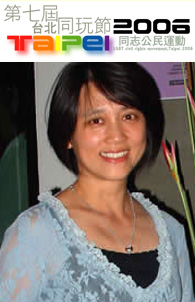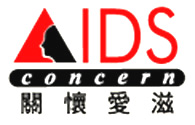Taipei govt sponsors "Queer-friendly Taipei" festival
A rainbow flag will be raised in an official ceremony for the first time above the City Hall in Taipei, Taiwan on 17 Sep to signal the start of the city's seventh "LGBT Civil Rights Movement - Queer-friendly Taipei" festival.

Wang Ping, secretary-general of the Gender/Sexuality Rights Association in Taiwan
The festival will be the first such ceremony in Asia, and is considered to be a powerful symbol of the embryonic gay rights movements in the region. In 2003,Taiwan became the first Asian country to announce its intention to legalise same-sex marriage although there has been no legislative action to date, despite pressure from gay rights activists.
Wang Ping, secretary-general of GSRAT, told The Taipei Times: "The recognition of the rights of gays and lesbians by all people requires making a long-term effort step by step. This festival will establish a bridge and allow the public to better understand the gay community."
Gay rights opponents comprising members of anti-gay religious groups and some Taipei City councilors have meanwhile attacked plans by the DCA to fund the festival citing scientific fallacies such as hosting the events would cause the city to be a "breeding ground" for HIV/AIDS and that homosexuality can be "corrected." Failing to do so would violate good morals and cause "sanitary problems."
Their protest has spurred Bruce Liao, an assistant professor of law at Soochow University and an adviser to the Taipei City Government's Human Rights Protection Committee, to write in the press urging civil rights groups to promote an anti-discrimination law to combat mainstream social prejudice and ensure basic civil rights in light of "the openly homophobic discourse which highlights the gravity of discrimination in Taiwan and how urgent it is that this discrimination is dealt with."
Translated and published in the Taipei Times last Friday, he stressed that sexual orientation is a matter of individual choice and practice, and being "homosexual or heterosexual is part of our fundamental freedoms."
He wrote: "The criticism leveled by religious groups is based on several rational and scientific fallacies. Homosexual orientation is not something that can be 'corrected,' homosexuality is not the primary source of HIV/AIDS, nor will legalising same-sex marriage lead to the extinction of the entire human race, since same-sex marriage will not "correct" the sexual orientation of heterosexuals and turn them into homosexuals. The deeper issue is the relationship between values and power.
"Unfortunately, the protectors of heterosexual dominance cannot tolerate the appearance of new and diverse social values, and they use public resources to suppress and discriminate against those who differ from them.
"This merging of superior power with mainstream values and the rejection of the other is the essence of discrimination."
He further called on the government declare a firm stance in this "cultural war" and not be allowed to vilify a homosexual orientation and lifestyle; and to continue to support similar activities based on the spirit of preserving cultural diversity.
Liao also urged the government to formally respond to religious groups and disallow any government agency from withdrawing sponsorship for LGBT activities for religious reasons as it might be in violation of the principle of separating church and state, which is ensured by the Constitution.
Third, although as the basic law on human rights might not materialise soon, the government should follow visionary international human rights standards and establish an effective mechanism for prohibiting any direct or indirect discrmination against homosexuals and other disadvantaged groups by government officials and private citizens.
Gay rights activists have also launched a Teachers' Day campaign on Tuesday to urge members of the public to each write a letter to their current or former teachers asking that they alter their attitudes on sexual identity. Organised by the Taiwan Tongzhi Hotline Association, they hope for the campaign to educate teachers about homosexuality as the subject is largely a taboo subject on school campuses and help teachers recognise the existence of homosexuals in schools.
The association has collected more than 20 letters, which it has faxed to more than 19 schools nationwide, including leading high schools such as Taipei Municipal Chien Kuo High School and Taipei First Girls High Schools.
Related sites:
The 7th LGBT Civil Rights Movement, Taipei 2006 (in Chinese)
Let's be done with all of the bigotry
AIDS Concern's response on the latest HIV/AIDS Statistics in Hong Kong

AIDS Concern has shown its concern in the latest HIV/AIDS statistics as released on 29 August, by the Department of Health. Compared to the same quarter in 2005, there is an increase of 29 per cent on new reported HIV/AIDS cases. Since July 2005 to June 2006, there was an average of one new reported HIV/AIDS case per day. The data also showed that a quarter of the new reported cases happened outside Hong Kong.
In response to the latest statistics and on the HIV/AIDS situations in Hong Kong, AIDS Concern has the following suggestions:
1. While scaling up its effort in HIV prevention among the men who have sex with men (MSM) community, the government should also strengthen its effort in targeting the cross border (both to and from China and other countries) travellers. We suggest that the government should take the lead and increase publicity campaign in all border checkpoints. Related government departments at the checkpoints can proactively display large-scale eye catching posters and give out educational pamphlets and flyers to remind Hong Kong people on the importance of safer sex practice.
2. The tourist industry also has a role to play in HIV/AIDS prevention. For example, include training on knowledge of infectious diseases such as dengue fever, malaria as well as HIV/AIDS in the training courses for tour guides organised by the Travel Industry Council of Hong Kong. Other examples such as distributing pamphlets on infectious diseases (including HIV/AIDS) at tea receptions organised by tour companies, or reserve free condoms for travellers on the tour buses or coaches are relatively simple but direct approaches in HIV prevention.
3. As there are so many travellers at different checkpoints daily and the above two suggestions are for the "general" travellers, we suggest that AIDS organisations and related agencies focus and strengthen their efforts on vulnerable communities such as truck drivers, sex worker clients, at risk youth as well as men who have sex with men, who are also frequent cross border travelers. Besides, the Council of the AIDS Trust Fund should adjust their flexibility in funding and resource allocation. Currently, the funding criteria does not support any projects outside Hong Kong, even though projects are intended to target HK people patronising the entertainment establishments in China. We suggest that funding allocation should "follow the people" so as to let the resources flow to areas where HK people are relatively sexually active. Such will allow the resources be flown to communities vulnerable to HIV/AIDS.
4. The government should grasp the latest HIV epidemic in overseas travel hot spots. HIV prevention messages to these travellers should be more visible, particularly in countries that are hardest hit by HIV/AIDS.
AIDS Concern encourages those who suspect being infected by HIV to come forward for testing. If you are unsure about your sex partner's HIV status, you should always use condom and practice safer sex to prevent HIV transmission. Do not share needles. Anyone who has concern or worry about HIV/AIDS can call our helpline 2898 4422 (every Thurs & Sat, 7pm - 10pm) for information and advice.
